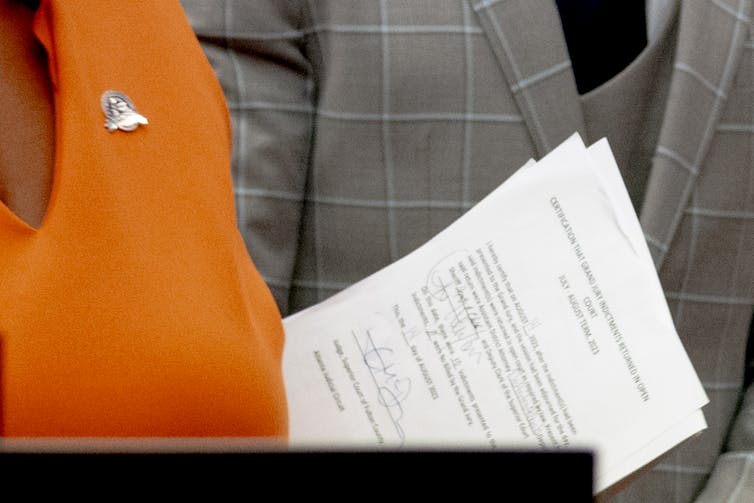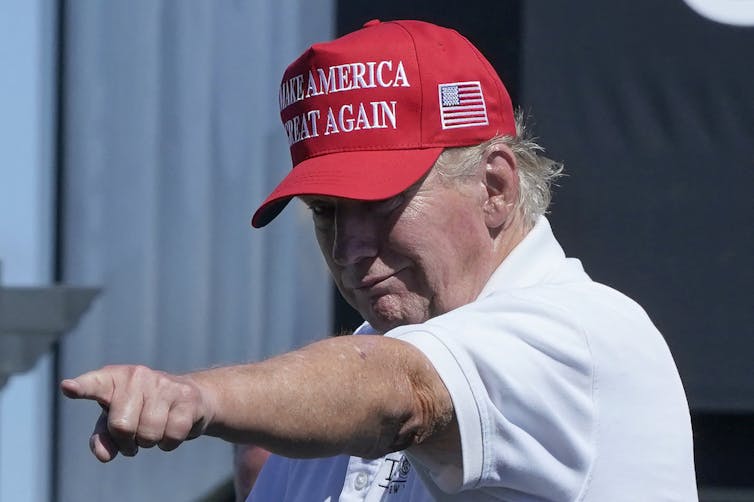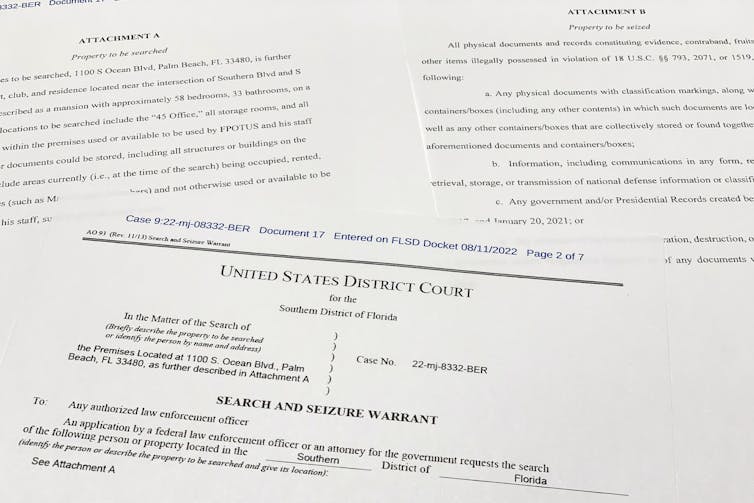by Darryl K. Brown, University of Virginia
If a person is charged by federal and state prosecutors – or prosecutors in different states – at the same time, which case goes first?
A county grand jury in Atlanta indicted former President Donald Trump and 18 associates on Aug. 14, 2023, on a collective 41 felony counts, including racketeering and forgery. The charges are linked to Trump’s alleged criminal conspiracy to overturn the 2020 election results.
The latest, sweeping state charges come on top of other mounting legal trouble Trump is facing at the state and federal levels.
Manhattan District Attorney Alvin Bragg first charged Trump in April 2023 with 34 felony counts of falsifying business records.
Then, in June 2023, the Justice Department indicted Trump on multiple criminal charges related to withholding classified government documents. One month later, the Justice Department indicted Trump again on unrelated felony charges regarding his alleged attempts to overturn the 2020 presidential election results.
Trump’s first trial, related to the New York business documents case, is scheduled to begin in March 2024. His federal classified documents trial is slated for May 2024. Fulton County District Attorney Fani Willis proposed to the court in a motion filed on Aug. 16, 2023, that the Georgia trial begin on March 5, 2024 –- a formal date has not yet been set.
Who gets priority?
I am a scholar of criminal law. It’s important to recognize that criminal law provides no clear answer on how to settle that question.

Megan Varner/Getty Images
No law dictating a path ahead
Nothing in the U.S. Constitution or federal law dictates that federal criminal cases get priority over state cases, or that prosecutions proceed in the order in which indictments are issued.
The solution ordinarily is that the various prosecutors will negotiate and decide among themselves which case should proceed first.
Often, the one that involves the most serious charges gets priority, although the availability of key witnesses or evidence could play a role.
But once one court has set a trial date, courts in other jurisdictions are likely to schedule around that date.
There are a few cases to look to as reference for state charges competing with federal ones.

Peter Dejong /AFP via Getty Images
After neo-Nazi James Fields drove his car into a group of protesters at the Unite the Right rally in Charlottesville, Virginia, in 2017, killing one person and injuring others, he was charged with crimes in both federal and state courts.
The state homicide trial went first. Then, Fields pleaded guilty to federal hate crime charges after the state conviction and received two life sentences for his crime from both the state and federal charges.
By contrast, “D.C. sniper” John Allen Muhammad was finally apprehended at a highway rest stop in Maryland in 2002, after a deadly series of sniper shootings in Maryland, Virginia and the District of Columbia that killed 10 people and injured three.
Maryland police arrested Muhammad. Then, federal officials were the first to file charges. But Muhammad was first put on trial and convicted of murder in Virginia.

Timothy A. Clary/AFP via Getty Images
Trump’s circumstances
In Trump’s case, all of his federal charges are likely to carry longer potential sentences than the state offenses. That said, I think that any actual sentence would surely be much shorter than the potential maximum penalty. This is typical, as per federal sentencing guidelines for any defendant with no previous criminal record.
It’s hard to reliably speculate on whether a federal sentence would be longer than Georgia’s five-year mandatory minimum sentence for a RICO conviction – although Georgia prisoners, unlike federal inmates, are eligible for parole.
The felonies he is facing in New York are white-collar crimes and may not result in any prison time, legal experts have said.
But the Georgia prosecution alleges much more serious charges. If Trump were convicted of most or all of them, avoiding a prison sentence would be an unprecedented development.
Of course, much about Trump’s case is unique. Never has a former president faced federal or state prosecution. That fact alone probably makes priority for the federal prosecution more likely.
An active presidential candidate has faced criminal charges in the past, though.
Socialist Party nominee Eugene Debs was prosecuted and convicted under the Espionage Act for his opposition to World War I in 1918. He campaigned from prison for the 1920 election, before losing to Republican Warren G. Harding.

AP Photo/Jon Elswick
Federal authorities could assert priority over state officials by taking custody of the defendant. But this has not yet happened, as judges determined Trump was not a flight risk following his brief arraignments at Washington, D.C., courthouses in June and July. States cannot arrest suspects who are outside the state’s borders, but federal law enforcement officers can arrest suspects anywhere in the country.
This is an updated version of an article originally published on June 8, 2023. This version was also updated to indicate it was a county grand jury in Atlanta, not a federal one.
Darryl K. Brown, Professor of Law, University of Virginia
This article is republished from The Conversation under a Creative Commons license. Read the original article.